Best Alternatives to airtable
Sick of Airtable? Here are the 8 best Airtable alternatives
Is Airtable failing to meet your needs? There’s tons of tools out there that hold up – here are our favorites for you to consider.
There’s a reason why Airtable is an industry leader in the field of spreadsheet-database tools. It makes organizing data and building AI-powered apps feel like you have an entire dev team at your fingertips. That being said, if you’ve been working in Airtable, you know the frustrations it can cause. Perhaps your once nimble and intuitive workspace starts to drag as your bases groan under data loads, and suddenly, what was a joyful experience feels clunky and expensive.
Searching for answers, you may discover that essential features are paywalled behind increasingly expensive pricing tiers. Does this sound like you? We at Grist, a fellow spreadsheet-database to compete with Airtable, are intimately aware of the nuances behind each and every competitor on the scene – including our own. That’s why we’re here to break down for you what alternatives to Airtable perform the best, so you can decide if another tool may better suit your needs.

The 8 best Airtable alternatives for your business in 2026
Grist for flexibility, affordability, and control
Smartsheet for project management
monday.com for task organization
Notion for document and content consolidation
Coda for bringing documents to your data
Baserow for a self-hosted version of Airtable
NocoDB for low-code databases
Rows for for spreadsheets with integrations
Grist: more flexibility, security, and control than Airtable
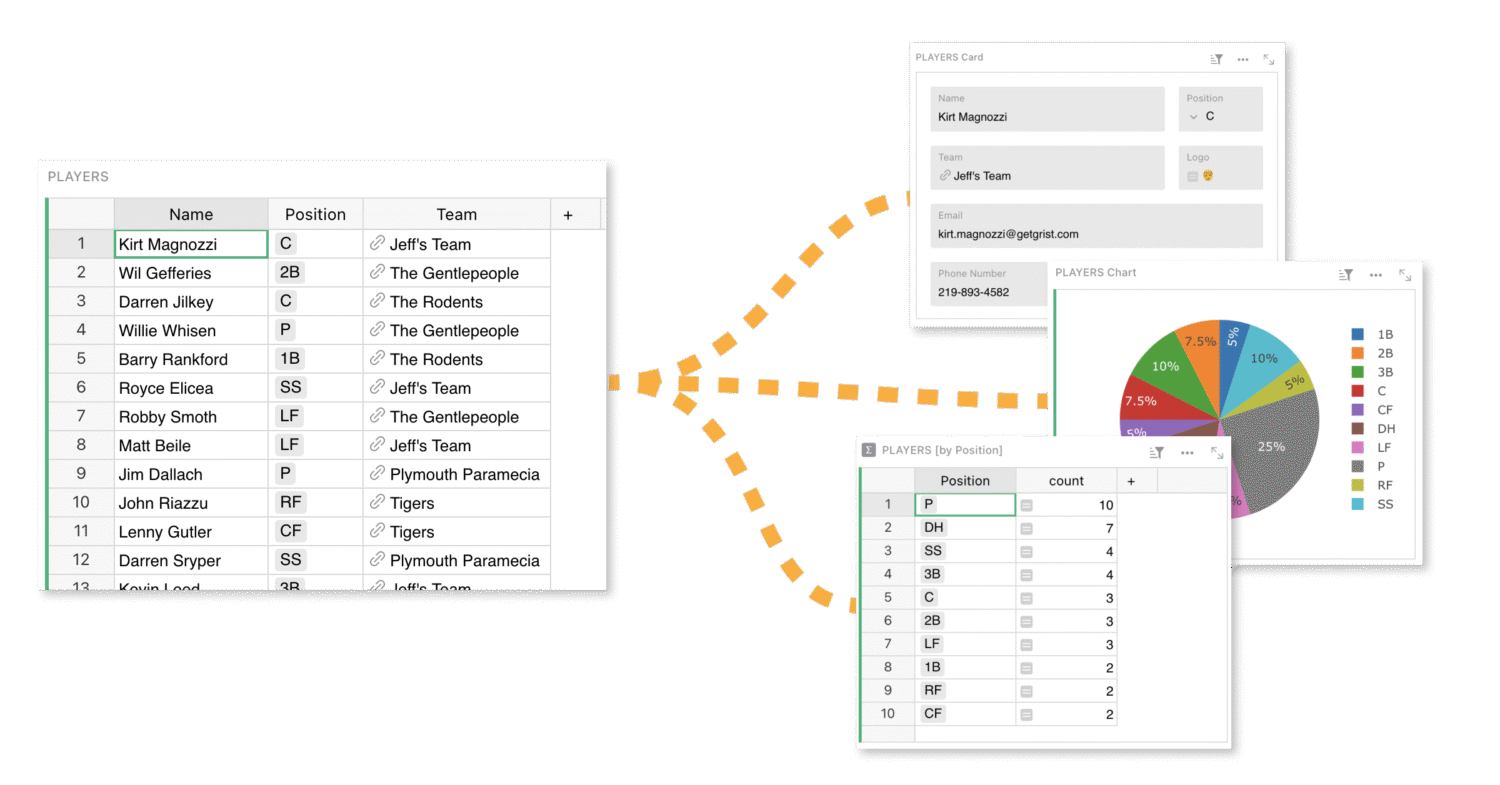
We’re starting with our own software because we firmly believe it can serve Airtable users as a mature and worthy open-source Airtable alternative.
At Grist, we set out to build the kind of data tool we felt was missing — a platform that is as powerful as a database yet as approachable as a spreadsheet; one that truly serves its users rather than locking them in with security risks of cloud hosting. Grist was born from our conviction that software should empower people, respect their privacy, and put them in control, not just as consumers but as creators and collaborators. We saw the limitations and risks in existing tools, like Airtable, and we designed Grist to be open-source and endlessly flexible. You can view a more in depth comparison on our Airtable vs Grist breakdown.
Why choose Grist?
With Grist, you get robust relational database features without sacrificing the ease of that spreadsheet feel. Our proudest features include a built-in AI Assistant for modifying documents and writing advanced Python-based formulas, granular access controls down to individual cells, as well as custom widgets that allow Grist to become the exact solution you need.
Grist at a glance
Strengths
- Relational-database similar to Airtable
- Real-time collaboration support
- Extensive customization options with drag-and-drop layouts for extremely custom applications
- Open-source flexibility allowing for self-hosted data and enhanced data sovereignty
- Built-in AI available on all plans in all documents
Considerations
- Learning curve for beginners
- Smaller community compared to bigger names like Airtable
- Limited native word processing document support
- Best for small to medium-sized datasets (<150k rows)
Grist pricing options
| Plan | Monthly price | Key features |
|---|---|---|
| Free | $0 | Unlimited number of documents, up to 5,000 records per document, snapshot history going back 30 days, AI Assistant, access rules, Python formula support |
| Pro | $10/user | Up to 100k records per document, snapshot history going back 3 years, higher AI Assistant usage cap |
| Team | $30/user | Up to 150k records per document, snapshot history going back 5 years, 20x more AI Assistant usage caps, priority support, professional services |
| Enterprise | $55/user | Dedicated server, custom SSO, custom domain, custom branding, admin controls, audit log streaming, multiple team sites, professional services |
Whether you’re working solo, running a small team, or managing data across a whole organization, Grist lets you structure and control your information your way without giving up privacy or flexibility. We built it because we needed a tool like this ourselves — and figured others probably did too.
Smartsheet: Enterprise-ready project management
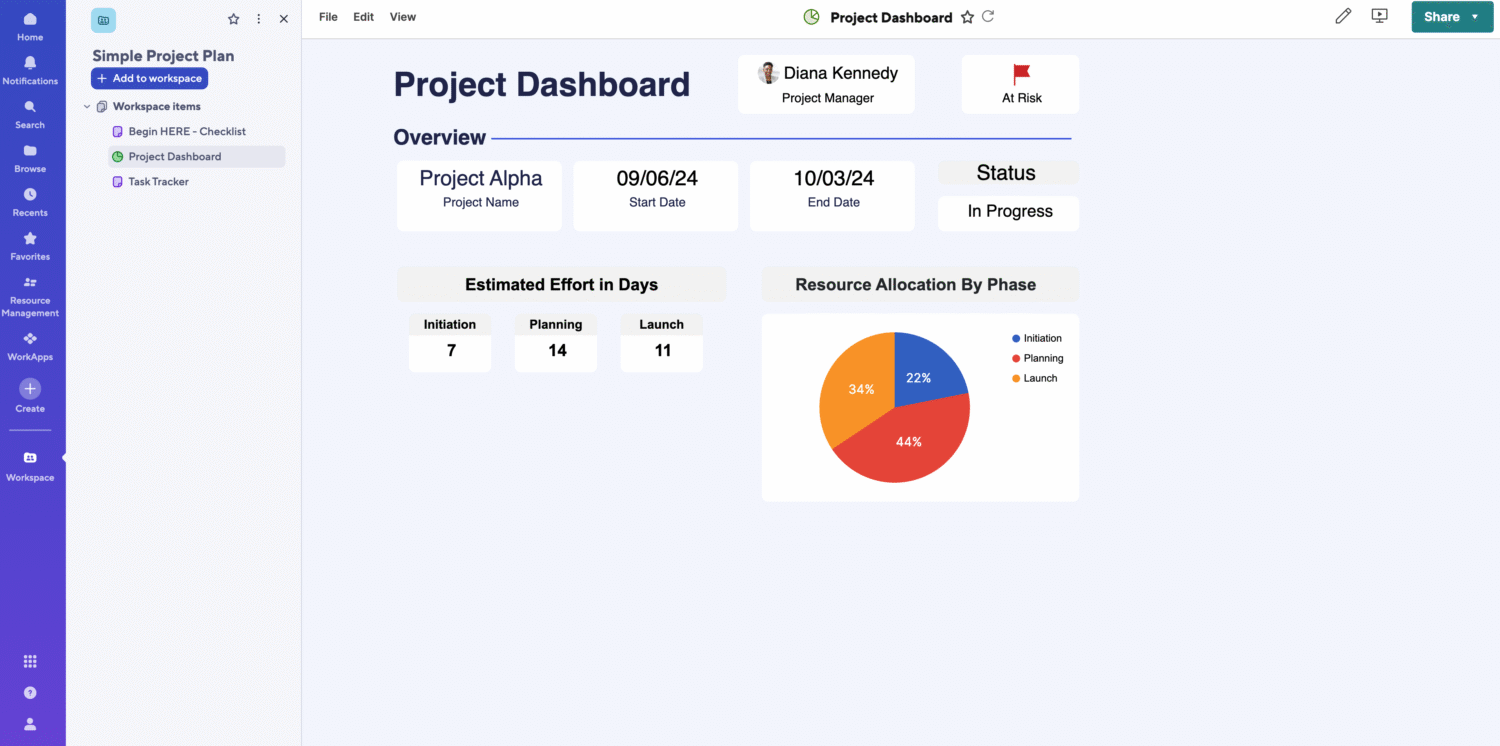
Smartsheet is known for blending project management tools with the familiarity of spreadsheets such as Microsoft Excel. Ideal for businesses that rely heavily on Gantt charts and automated task dependencies, Smartsheet offers extensive integrations with Microsoft 365 and Google Sheets.
Smartsheet at a glance
Strengths
- Familiar interface similar to Excel
- Strong workflow automation with automated triggers
- Advanced reporting and dashboards that are easy to use
- Specialized features catered directly to project managers
Considerations
- Limited customization options
- Limited free plan
- AI only available on Enterprise plan
- Lacks advanced formula support
Smartsheet pricing options
| Plan | Monthly price | Key features |
|---|---|---|
| Free (30-day trial only) | $0 | 1 user with 2 editors, 2 sheets, basic views only, limited automations |
| Pro | $12/user | Up to 10 editors, 10 sheets/user, automated workflows, forms, dashboards, basic integrations |
| Team | $24/user | Unlimited editors, unlimited sheets, advanced reporting, resource management, advanced automations, document builder, integrations, access control |
| Enterprise | Custom | AI formulas, Enterprise-grade security, Control Center, portfolio reporting, premium support, user provisioning, HIPAA/BAA, advanced compliance, dedicated success manager |
Smartsheet tends to excel the most for project managers collaborating with outside contractors or vendors, as well as serving as a serviceable step-up from Excel and Google Sheets without a significant learning curve. That being said, Smartsheet often struggles with extensibility when compared to other alternatives to Airtable. If a spreadsheet with project management capability is all you need, Smartsheet is a excellent choice. If your business needs a more flexible custom solution, you will find its vendor lock-in and lack of integrations limiting.
If you’re interested in delving more in-depth about the advantages and disadvantages of Smartsheet against app builders like Airtable and Grist, check out our Smartsheet vs Grist breakdown.
monday.com: visually intuitive task management
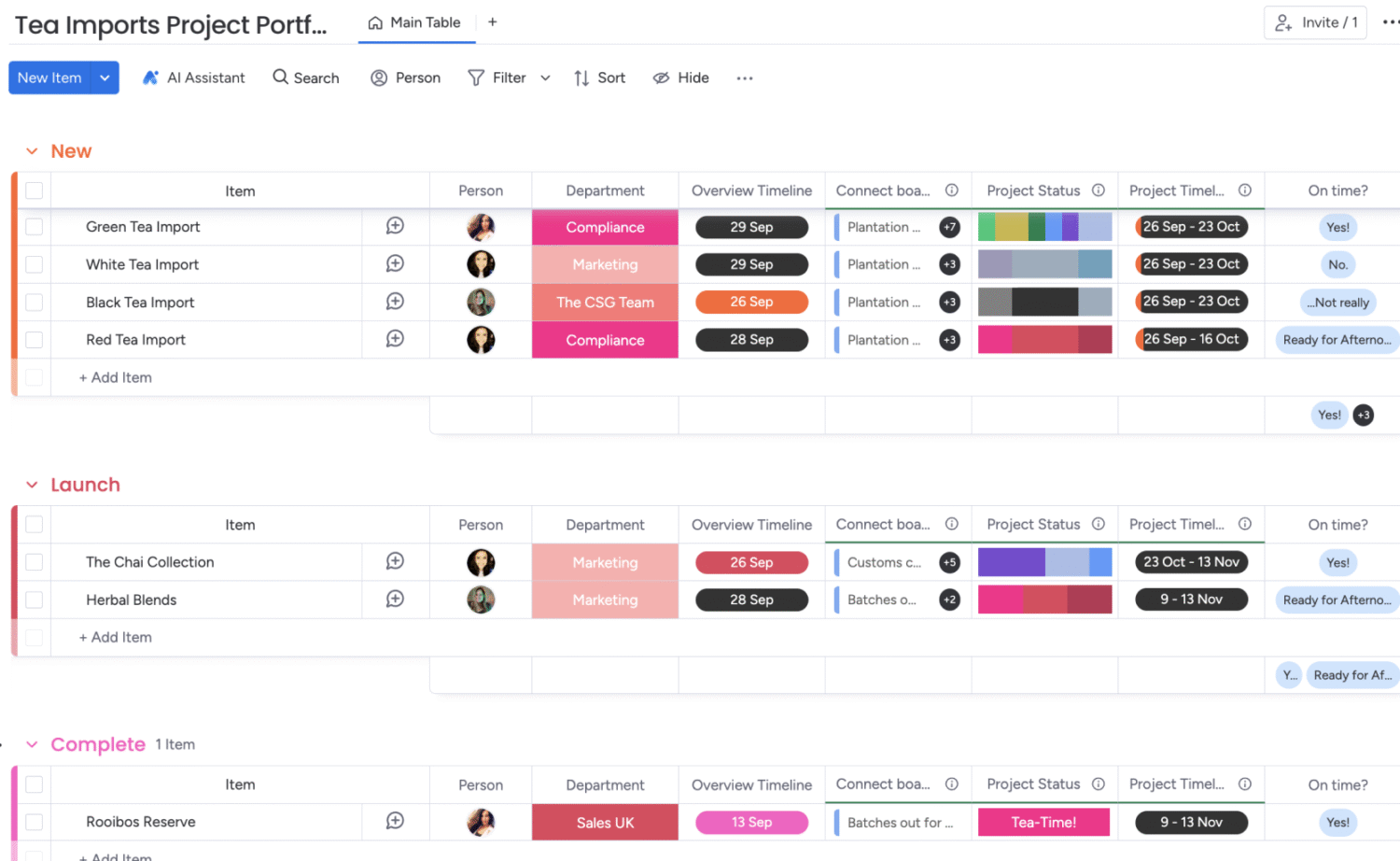
monday.com brings arguably best-in-class premade structure for plug-and-play usage. It comes launch-ready with task visualization, Kanban Boards and intuitive user interfaces. With strong automation workflows and hundreds of integrations, it’s a great choice for teams with who don’t need the technical capabilities of structured data and custom apps.
monday.com at a glance
Strengths
monday.com pricing options
Monday is best for medium and large-sized enterprises with low cost sensitivity and desire for minimal switching costs. It’s a great visual task management board, but offers little else if you’re looking for scalable custom solutions. Read more in our monday.com vs Grist breakdown to better decide if it’s the best product for your business’ needs.
Notion: all-in-one workspace consolidation

Notion shines in content organization with its block-based editing and powerful collaborative editing capabilities. It’s an all-in-one workspace ideal for documentation and project tracking.
Notion at a glance
Strengths
Notion pricing options
When comparing Notion to Airtable, both have similar strengths but perform best in specific niches. Spreadsheet-databases like Airtable and Grist are best for managing structured data, without the complexity of pure databases. Notion, on the other hand, shines most when your team is juggling too many separate tools and needs a single workspace to bring together documents, notes, and project tracking in one place.
Coda: documents meet databases
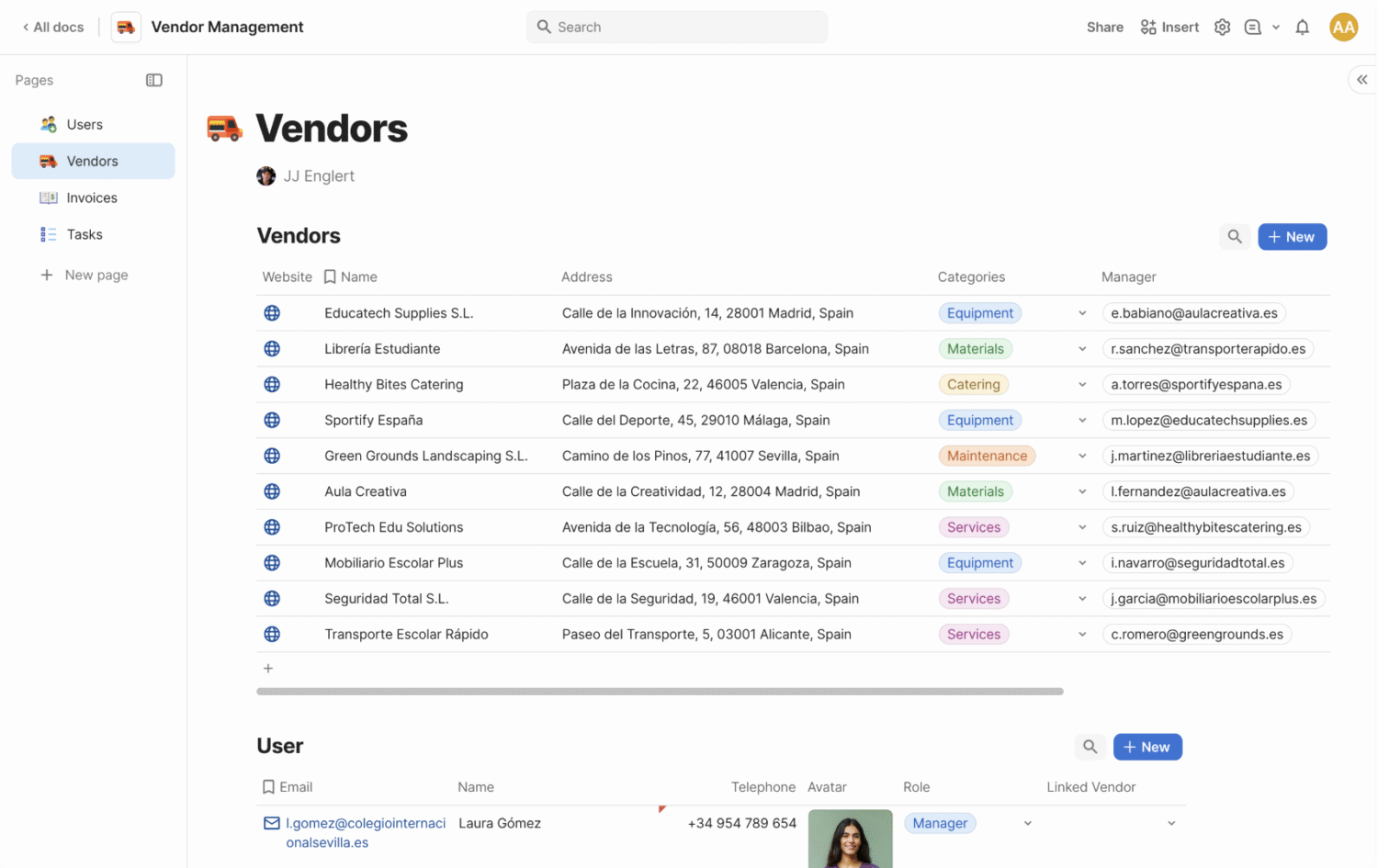
Coda, similar to Notion, is ideal for those who need to combine multiple common tools — documents, tables, and apps, for example — into one platform. Users can create their own workflows using buttons, formulas, and automations. Real-time collaboration features also make project management easier. This is especially so when gathering structured feedback or managing interactive documents.
Coda at a glance
Strengths
- Interactive document-based setup
- Strong integration capabilities
- Allows non-technical users to create no-code or low-code automations
- Built-in AI that assists in writing and analysis
Considerations
- Complex for new users
- Not a database-based app; large documents experience performance issues
- Expensive for small teams in need of multiple document creators
- Lacks advanced analytics; limited to simple formulas and basic charting
Coda pricing options
| Plan | Monthly price | Key features |
|---|---|---|
| Free | $0 | Unlimited users, 1GB attachments/doc, limited automations, 7-day version history |
| Pro | $12/user | Unlimited doc size, 5GB attachments/doc, more automations, 30-day version history, Pro Packs |
| Team | $36/user | Unlimited automations/storage, advanced doc controls, team Packs, admin features, premium support |
| Enterprise | Custom | Advanced security, user provisioning, SSO, SOC 2, expert support, audit logs, Enterprise Packs |
Coda integrates with over 600 applications through Packs and Zapier, giving it top-end integration ability among competitors on the market. Coda’s built-in AI tools assist with tasks like content generation, summarizing documents, and extracting insights from data. That being said, also like Notion, Coda is not ideal for teams with structured data or advanced visualization and analysis needs.
Baserow: open-source freedom and scalability
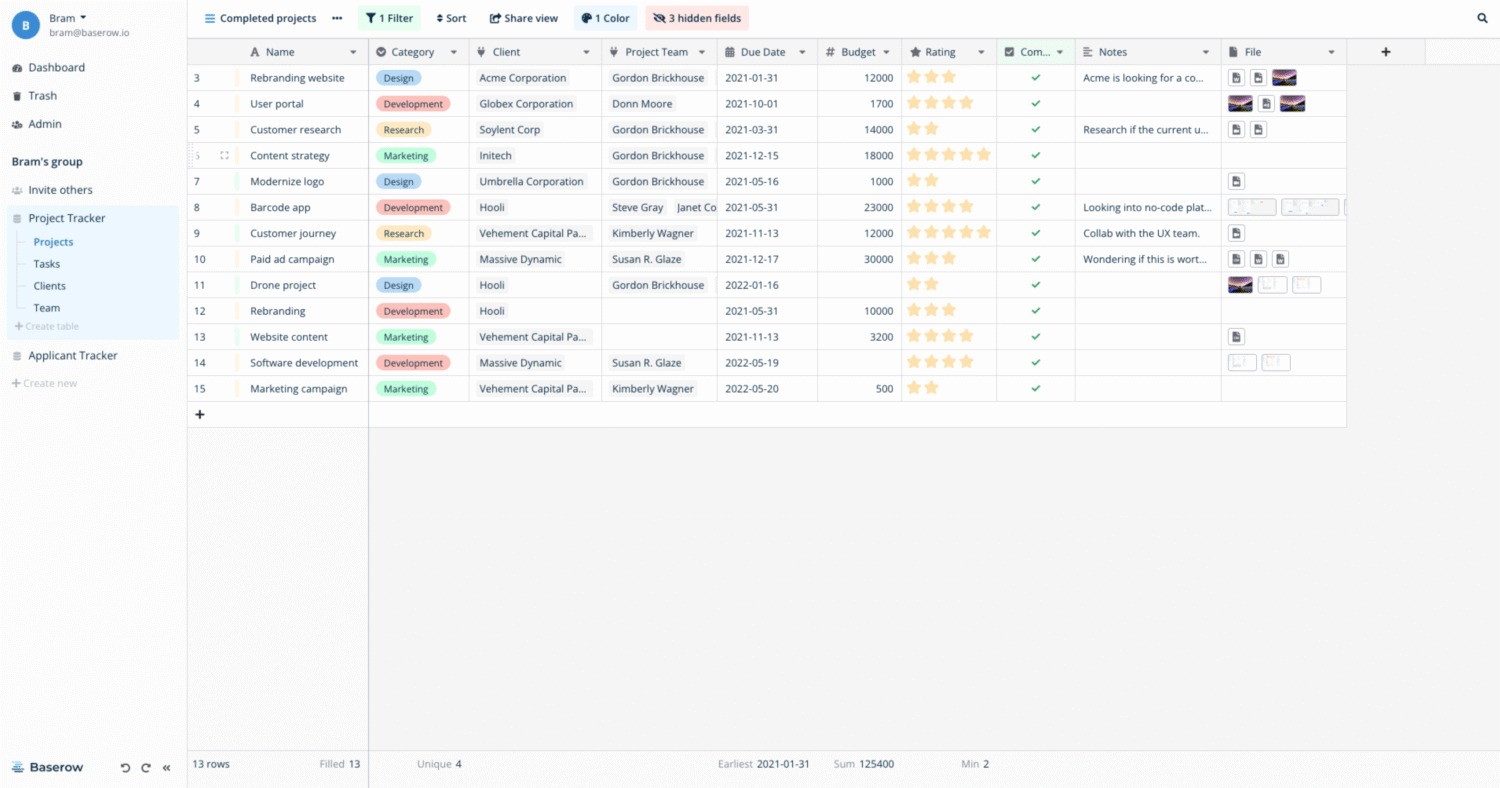
Baserow offers a spreadsheet-like experience with robust database-style setups and powerful API support. As an open-source platform, it’s great for developers and privacy-conscious teams.
Baserow at a glance
Strengths
- Open-source and self-hostable
- Customizable fields, roles, dashboards, and templates for tailored database setups
- Supports Grid, Kanban, Calendar, Form, Survey, and Gallery views for various workflows and visualizations
- More affordable at scale than other no-code platforms, with flexible deployment options
Considerations
- Complex for new users
- Not a database-based app; large documents experience performance issues
- Expensive for small teams
- Advanced views and XML, JSON, and Excel exports are locked behind paid plans
Baserow pricing options
| Plan | Monthly price | Key features |
|---|---|---|
| Free | $0 | Unlimited databases, 3,000 rows, 2GB/workspace (Cloud), basic views |
| Premium | $12/user | Unlimited databases, 10,000 rows, 5GB/workspace, more views, automations |
| Team | $22/user | 250,000 rows, 20GB/storage, role-based permissions, priority support, advanced admin, App Builder (self-host/cloud) |
| Enterprise | Custom | Unlimited rows/storage (self-hosted), SSO, audit logs, instance-wide admin, all features, priority support. Pricing depends on user count and requirements. |
Baserow is overall a data management tool with smaller-scale support but strong customization options. It’s a platform similar to Grist that is easy to use, but can leave users wanting in data limits, formula power, and advanced views.
NocoDB: smart spreadsheet-databases
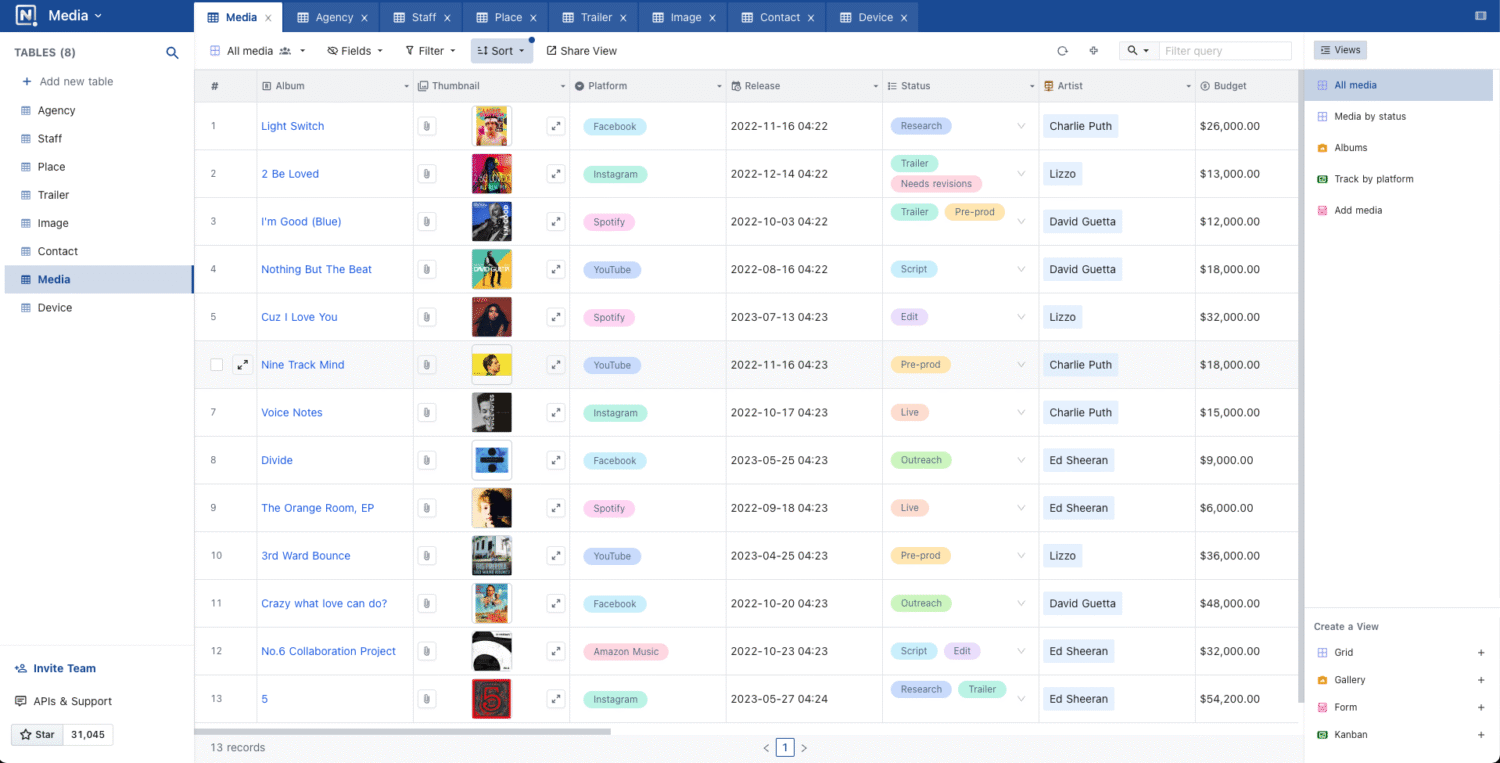
It appeals to developers and technically inclined teams who want a no-code way to interact with MySQL, PostgreSQL, or other relational databases without giving up the underlying structure. Its standout strength lies in interoperability — it integrates easily with existing databases and external tools through REST API, webhooks, and automation tools like Zapier.
NocoDB at a glance
Strengths
Considerations
- The free plan’s API call and row caps may not be sufficient for serious business or automation use
- Lacks some complex statistical, visualization, and pivoting features found in Excel/Sheets
- No full desktop app, limiting offline access
- Limited native integrations
NocoDB pricing options
| Plan | Monthly price | Key features |
|---|---|---|
| Free | $0 | Unlimited docs, 10 monthly API calls, 50 rows/table, 5 collaborators, basic integrations, dashboards |
| Starter | $8/user | 100 monthly API calls, unlimited rows, up to 10 editors, enhanced integrations, doc history |
| Pro | $24/user | 1000+ monthly API calls, premium integrations, unlimited collaborators, API connector, automation scheduling, priority support |
| Business | Custom | 100K+ API calls, SSO, admin tools, audit logs, advanced security, custom integrations, dedicated support |
NocoDB covers many essentials like real-time collaboration, form building, and automated workflows. It shines in handling large data, a feature that stands out among rival Airtable alternatives. However, it lacks some of the advanced capabilities found in more mature platforms. Formula functionality is limited, such as no native Python or spreadsheet-style functions. For teams seeking a flexible backend that can handle large data and basic app-building, NocoDB can be a solid, low-cost option — just expect to do more of the heavy lifting yourself.
Rows: integrative spreadsheets with a familiar feel
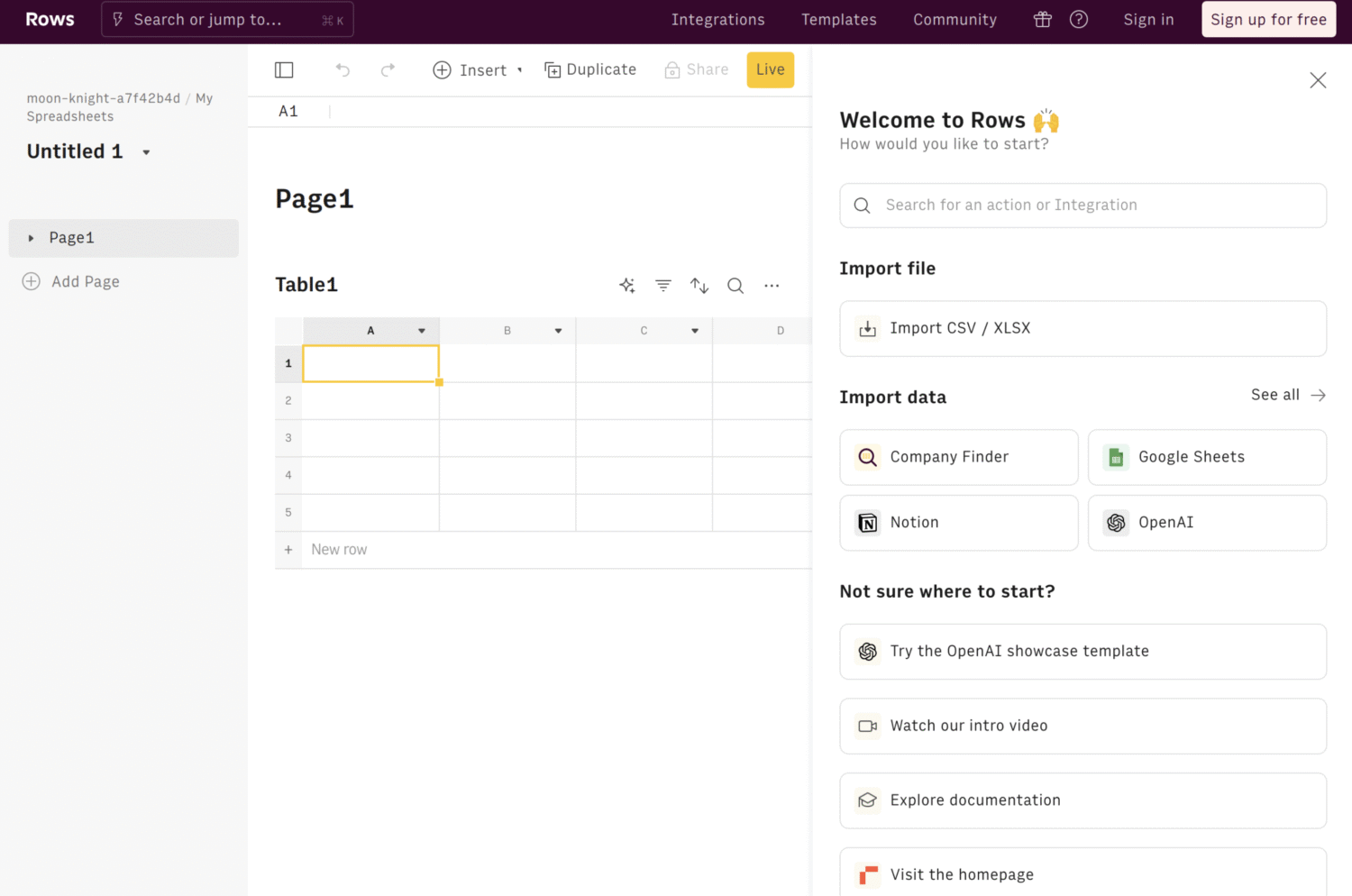
Rows is built for teams that already live in spreadsheets and want a smoother experience – cleaner design, better charts, and easier access to tools like Slack, Notion, and Google Analytics. Its standout feature is the AI Analyst, which lets users ask questions about their data in plain language. That said, Rows is still fundamentally a spreadsheet. It doesn’t support relational database structure, and documents with larger datasets may see performance issues.
Rows at a glance
Strengths
Rows pricing options
Built for users looking to upgrade basic spreadsheet workflows — without adopting a more complex database-style setup — Rows is a lightweight, accessible choice.
Final Thoughts
Choosing an Airtable alternative in 2025 depends on your team’s size, budget management, and feature needs. From Grist’s powerful formulas and open-source flexibility to Smartsheet’s project-centric workflows or Monday.com’s visual management, there’s something for everyone. So why not explore these options and find your perfect match today?

